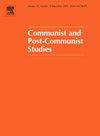柬埔寨的组织力量和威权持久性
IF 1.3
4区 社会学
Q3 INTERNATIONAL RELATIONS
引用次数: 2
摘要
本文借鉴了多种数据来源,包括纵向实地研究,如对不同利益相关者政党官员、民间社会组织领导人和在柬埔寨开展业务的国际机构代表的采访。利用一党专制主义持久性的文献分析这些数据,我们认为柬埔寨的专制持久性与执政党的实力有关,其根源在于该党从20世纪70年代末到90年代初的解放运动和平叛斗争的演变。这场运动和斗争在党的领导层中培养了一种共同的苦难感和共同的身份,这反过来又产生了持久的党派身份、严格的党际界限和强大的党的组织结构。此外,我们假设,通过与自然资源开采、外国援助和外国投资相关的租金,赞助慷慨的分配可能进一步加强了执政党,使其能够在监督和动员选民以及对其挑战者行使胁迫方面投射基础设施力量。本文章由计算机程序翻译,如有差异,请以英文原文为准。
Organizational Strength and Authoritarian Durability in Cambodia
This article draws from multiple sources of data including longitudinal field research such as interviews with diverse stakeholders—party apparatchik, leaders of civil society organizations, and representatives of international institutions operating in Cambodia. Analyzing these data using the literature on the durability of single-party authoritarianism, we argue that authoritarian durability in Cambodia is associated with the ruling party’s strength, which has its roots in the party’s evolution from a liberation movement and counterinsurgency struggle from the late 1970s to the early 1990s. This movement and struggle fostered a shared sense of hardship, and a common identity among the party’s leadership, which in turn generated enduring partisan identities, rigid interparty boundaries, and strong party organizational structure. Additionally, we postulate that distribution of patronage largesse made possible through rents associated with extraction of natural resources, foreign aid, and foreign investment further strengthened the ruling party, allowing it to project infrastructural power in surveilling and mobilizing voters and in exercising coercion against its challengers.
求助全文
通过发布文献求助,成功后即可免费获取论文全文。
去求助
来源期刊

Communist and Post-Communist Studies
Multiple-
CiteScore
1.90
自引率
0.00%
发文量
23
期刊介绍:
Communist and Post-Communist Studies is an international journal covering all communist and post-communist states and communist movements, including both their domestic policies and their international relations. It is focused on the analysis of historical as well as current developments in the communist and post-communist world, including ideology, economy and society. It also aims to provide comparative foci on a given subject by inviting comments of a comparative character from scholars specializing in the same subject matter but in different countries.
 求助内容:
求助内容: 应助结果提醒方式:
应助结果提醒方式:


